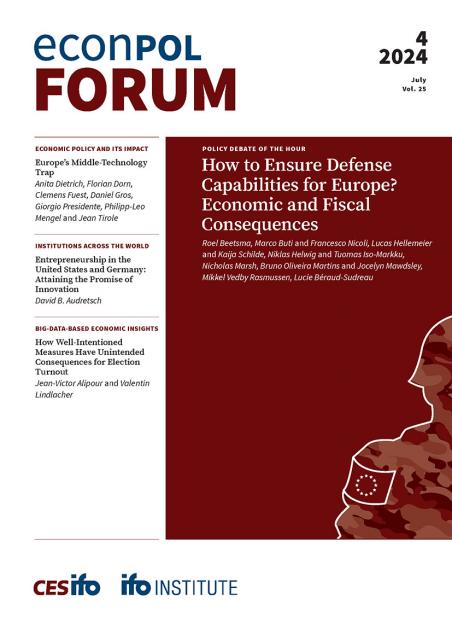How to Ensure Defense Capabilities for Europe? Economic and Fiscal Consequences
Articles included
POLICY DEBATE OF THE HOUR
Introduction to the Issue on How to Ensure Defense Capabilities for Europe? Economic and Fiscal Consequences
Chang Woon Nam
EconPol Forum 25 (4), 03-04
Defense as a European Public Good: Delivery and Financing
Roel Beetsma, Marco Buti and Francesco Nicoli
EconPol Forum 25 (4), 05-10
Markets in Defense of Europe: Providing Public Goods in European Defense
Lucas Hellemeier and Kaija Schilde
EconPol Forum 25 (4), 11-14
The EU’s Different Modes of Defense Governance: More European Defense, But How?
Niklas Helwig and Tuomas Iso-Markku
EconPol Forum 25 (4), 15-19
European Defense Spending: Trade-Offs and Consequences of Non-Alignment
Nicholas Marsh, Bruno Oliveira Martins and Jocelyn Mawdsley
EconPol Forum 25 (4), 20-23
Rearmament with a Purpose
Mikkel Vedby Rasmussen
EconPol Forum 25 (4), 24-27
Europe’s Other Arms Production Problem: “New Defense”
Lucie Béraud-Sudreau
EconPol Forum 25 (4), 28-31
ECONOMIC POLICY AND ITS IMPACT
Europe’s Middle-Technology Trap
Anita Dietrich, Florian Dorn, Clemens Fuest, Daniel Gros, Giorgio Presidente, Philipp-Leo Mengel and Jean Tirole
EconPol Forum 25 (4), 32-39
INSTITUTIONS ACROSS THE WORLD
Entrepreneurship in the United States and Germany: Attaining the Promise of Innovation
David B. Audretsch
EconPol Forum 25 (4), 40-44
BIG DATA-BASED ECONOMIC INSIGHTS
How Well-Intentioned Measures Have Unintended Consequences for Election Turnout
Jean-Victor Alipour and Valentin Lindlacher
EconPol Forum 25 (3), 45-48
Russia’s invasion of Ukraine has raised the question of whether the issue of external border security and defense needs to be more closely integrated within the European Union. Many proposals are under discussion aimed at assigning the EU with tasks that are currently performed at national level. Most EU members have increased their defense spending in the past year or plan to do so soon. However, whether an EU defense union is politically achievable remains controversial. It entails additional costs and ‒ even more importantly ‒ the member states would have to give up some of their sovereignty. The project is linked to the plan to build a robust and efficient defense industry. This is because European arms production has so far suffered from national fragmentation and chronic underfunding. In this issue of EconPol Forum, our authors take a critical look at the needs of the common EU defense policy. They examine how it should be efficiently financed and coordinated at EU and national level. They also provide insights into the role of the European defense industry in a single market and its strengths and weaknesses in a global context. Furthermore, they shed light on the financing of R&D and technology through the EU’s coordinated defense policy and its expected impact on growth, productivity, and competitiveness.
“How to Ensure Defense Capabilities for Europe? Economic and Fiscal Consequences” EconPol Forum 25 (4), CESifo, Munich, 2024.
